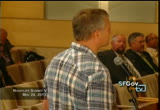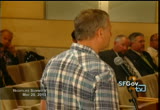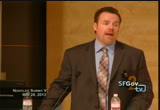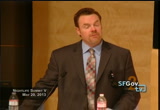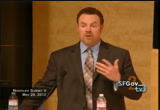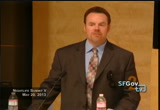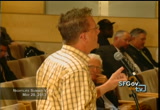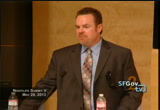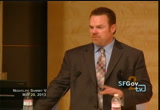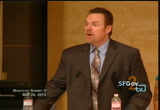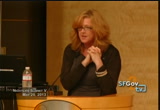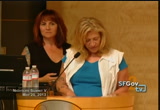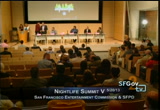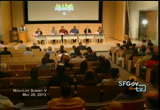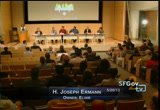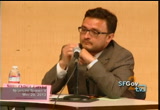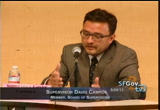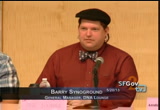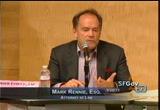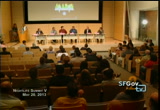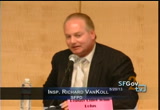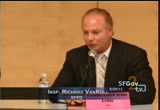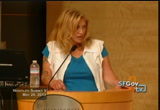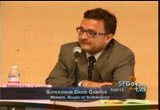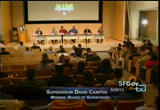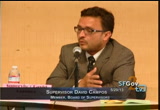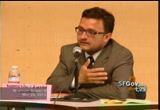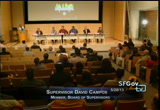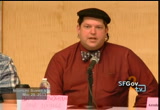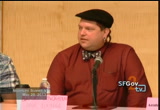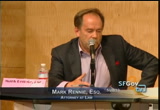tv [untitled] August 27, 2013 10:30pm-11:01pm PDT
10:30 pm
a $300-500 course to use colored liquid. if we are expected to do this for educational purposes, i imagine that we have to do the same thing, to go through the legislators to propose that to the public and propose it to the abc. i believe this nightlife summit was create because of problems in the public, there was problems with noise, problems with over drinking, a lot of our laws are based on that. i'm here to propose that we have more responsible training for our bar tenders and servers. the cocktail boom around the country has turned bartenders into a true professional. now
10:31 pm
that professional bartender's job is in question. >> i'm sure it's around the whole notion of where you can drink alcohol and the idea of one of those courses or presentations or event would whether or not it would constitute a public, somebody opened to the public or whether it was essentially amounting to commercial use of alcohol. and, you know, frankly the law is pretty clear on it and we have not or give a quota to a situation where there is any kind of commercial use of alcohol without the benefit of abc license. there are
10:32 pm
innovative ways to get ourselves into a scenario, a licensed scenario that could let something like that work and another option would be to hold these courses on locations that are already licensed for the sale or service of alcohol. unfortunately i'm not familiar with that challenge that you are talking about. if it came down to wanting to have a carved out exception to allow tasting for the sake of educational purposes would like ly take legislation. it's not that something that's happened similarly from a legislative side was for the an allowance of cooking schools for the service of wine in terms of
10:33 pm
pairing and that kind of thing at a location that didn't have to be a full service sit down traditional restaurant. that was sponsored and made it through the legislation easily. so i would probably say a similar effort toward the furtherance of the art of cocktail in itself would probably not meet with much more resistance. we are also dealing with and this is something we all know is the three tiered system in the alcohol world is a very strong one and it's no stronger within the industry than it is from the liquor side. there are exceptions that run out from the wine side and beer as working it's way towards a lot of easing away from the strict
10:34 pm
three tiered side. any from that end is probably going to run into more resistance. there is a bill pending now regarding distilled factories having limit tasting at their premises. it's approving but -- moving but not so fast from manufacturing interest. if you have questions, we would like to hear it. we would like to hear what kind of scenario you might have here and specifically something that wouldn't involve legislation, per say. >> the first part of my question is to thank you to
10:35 pm
abc. last year the california music association brought forward the issue of the abc putting 50 percent food, 50 percent liquor conditions on type 47 licenses. that has stopped and we all thank you for that. the problem we are now facing is a democracy of one. under the a bc rules and regulation and law, one person can effectively shut down an entire business. we are seeing that occur in san francisco especially as new people move in with a new set of expectations, different values and different backgrounds and suddenly they are confronted with a city experience and that one person can shut down a business. how do we address that so that we have more of a democratic process when it comes to the future of these
10:36 pm
investments and the future jobs that all of these places create, thank you. >> thank you. it's a great point to bring up and one we would really like to talk about. what we are talking about here is delay. people who have the knowledge about how to get something to go away is to delay it as much as you can. we have not always been as efficient as we could be when it comes down to investigating maybe a singular protest for a licensing application when it goes through and our investigative role sometimes turns to a mediation role or a pursuit of compromised role
10:37 pm
and depending on the parties which you describe. we are working everyday in taking ourselves in a different direction with these kinds. if we have a protest issue brought during a protest period, our effort is going to look into that and make our determination in a timely way and if we can't get things settled we are going to move forward with a recommendation of approval and we are going to make much more use of, we already have made much more use of the in the last several years of the interim operating permits. that doesn't always get things done in some of the difficulties that come along with operating under that but it's one of those things that we feel good about the the idea that we can get some doors opened while having to go through these process. we get it in terms of
10:38 pm
what it means to these folks and how you sit on that day because that one can mean to you because you have a broad community base support and someone from across the district or across town decides to throw something into our lap. i can say that what we are doing is working with the powers that we have to make sure that we don't let ourselves get used as the regulatory agency and work forward to the powers that we have to give due process no. 1, to community involvement to community in put in the community licensing is why we are here but we also recognize the industry that is developed from what we call professional
10:39 pm
protesters. we are obligated to address the concerns that are raised in what they submit to us and given their day but we also have a way that things work and everyday we are working closer to getting doors open while that process is in place. [ applause ] >> thank you so much. all right. it's that time again. >> i know. i want you to do that music. okay. coming up shortly at some point we'll have our chief of the san francisco police department. this next trivia question for your yellow card is about the chief. he's a bit of a rocker at heart although you may not think of that when you see him. so the question is what was
10:40 pm
chief greg's first rock concert. it was 1975. question no. 3. write down chief's greg concert. >> there is a sea of blue in the back of the room. i hope you know the answer. and speaking of the chief, he has texted us that he's been delayed and on his way but he's not here yet. so what we are going to do now is i'm going to bring up our executive director jocelyn king who is already here and we are going to introduce our panel. we have a couple questions that many of you are interested in and we hope that our panel can address that. our first panel member is supervisor david campos. [ applause ] >> our second panel member is
10:41 pm
10:42 pm
have questions. just be nice and there is that mic. it's cord less. you can pull it out and move it around the crowd if you want to. yes. thanks again for coming. we'll take later. >> okay, panelist, recently for the second time senator mark, introduced last call at 4 a.m.. this would leave it to individual jurisdictions to determine whether or not they wanted to implement a 4 a.m. last call. the resolution did not make it through the committee. keeping in mind that other cities have late last calls and many foreign visitors are used to late hours. can you address the problem with last call as it relates to the problem with san francisco as
10:43 pm
it strives to compete with tourism. who would like to start? h? >> why don't you start. >> okay. having an international background and having lived in europe, i think it is paramount to the success if the future of san francisco's image that we attract a global community to come here and entertain themselves and we have a quality of nightlife here that should support that. in my opinion, the 4 a.m. law should be specific to particular businesses, quite frankly. i wouldn't want it for my own business, i wouldn't want it for elixir and it wouldn't apply for my corner and for my neighbors, but it could work on valencia street. it could work in areas where there are --
10:44 pm
where it's less likely to be disruptive to and that would help to broaden our spectrum on whether or not nightlife can support that. >> thank you, supervisor? >> thank you. i'm a strong supporter of s b 645 and supervisor wiener and i are in support. there is a lot of fear that comes with change. the key here is to make people understand what we are talking about. there are 9 states where this has already happened. there are dozens of cities that are an allowing this to happen and the world has not come to an end because what we are talking about is simply local control. the point of this legislation is simply to have jurisdictions like san francisco decide for itself what makes sense and the idea
10:45 pm
which we were never going to have a blanket rule throughout the city but that we would take it on a case by case city and we would allow the city to figure out and work with city government to see what makes sense. from a public safety issue there is an argument to be made that as a matter of public safety, it's good to have that opportunity, to have different businesses close at different times. i used to be on the police commission i know that everyone that closes at a specific time becomes a challenge for the police department. i think this is legislation that makes sense. there are world class cities throughout this country and throughout the world that are already doing it and i think that san francisco is lagging behind and one of the reasons that i as a gay man came to san francisco because of the entertainment nightlife that we have here. i think there is a way of promoting that and still
10:46 pm
maintaining public safety which is always the excuse to not do it. >> larry? >> as an operator of a late night venue already i can tell you that having late night service would certainly contribute to public safety. i know my business stays open often until 4 a.m.. we have a trickle out of patrons as opposed to many of businesses have a dumping of patrons. my patrons don't all dump out and have interaction and conflict unlike other businesses. i think that's a very good point. >> mr. rene? >> i was involved the first
10:47 pm
time we tried this 4 a.m. legislation in sacramento whether it was mother's against drunk driving and our patrol showed up with crying mothers. but forget world class cities, it's kind of embarrassing when indianapolis and memphis and milwaukee and 25 largest cities in america have 4 a.m. legislation to allow service and the data and the sciences out there, seattle spent a lot of money doing a big study about whether or not they should pass a 4 a.m. legislation and what happened was driving fatalities go down and a lot of alcohol problems go down. there is a lot of positive stuff that comes out of this an i also owned a nightclub in the 80s in south of market. at 1:45 a.m. people
10:48 pm
are slamming down drinks. i think if you want to give them alcohol let them slowly trickle out. it's going to make it a lot easier for police and more cabs on the streets to take people who are inebriated home. that said, i don't think you want to put it out in richmond and residential neighborhoods, but certainly large entertainment venues will attract a lot of customers and bring in tax dollars for the city if we do this. >> strictly from a security perspective we have the problems at night. we are flooding the streets with drunk people, with more people at one time than any other time throughout the night and it's
10:49 pm
taxing on laughed, taxing on security and neighborhood. so having a staggered approach, not every venue should be able to go to 4:00 a.m. and i agree with that. bars go to a certain point and maybe there is a clear definition of those industries and subcategories are. absolutely it's a necessary tool for us to make sure that we limit the amount of violence that happens every night. >> that's a difficult question for law enforcement standpoint. i think it's a good time for another trivia question. [ laughter ] which seated commissioner was tinker bell at disneyland. we take pride in ourselves to the police department to be very open minded and i think that most of the venues that deals with the security or patrons or
10:50 pm
entrepreneurs will know that we are very open minded and we listen to all concerns. this is a hot topic and it would be a drain on our resources if they stayed open until 4:00. a.m.. it -- a study was done in the norwegian studies and this determined there was more crime. you know in las vegas they stay open 24 hours a day and they found more drunk driving arrest at 6:00 in the morning. it's no second that we are going to be rereplenished. in the the next months there
10:51 pm
are a couple officers leaving the department. it's something that we are open to down the road. that's the beauty, we sit down and craft conditions and we look at it from a community's standpoint. at this point it wouldn't be favorable to the police department. >> thank you very much. does anyone else want to comment before i go on to the next question? okay. >> keeping in mind our dependence on media and the recent boston bombing and our reverence to privacy can you talk about cameras outside of buildings. i would like to start with supervisor campos. >> thank you very much. i don't
10:52 pm
think that anyone disagrees that we want to do everything we can to make sure that we have as safe a city as we can and i think that what happened in boston is tragic and there is every reason for us to worry about whether something like that can happen in san francisco. but i think that you have to be very careful and to make sure that when you are taking steps to respond to a tragedy like that one, that you are also not over stepping the line where you are actually undermining civil liberties. i think that one of the unfortunate things about policy being made out of a tragic incident is that history shows you that a lot of that turns out to be bad policy and so, i personally don't have a problem and would like to see that there is availability of the kind of footage that we had in boston, we know the cameras in
10:53 pm
that case did save lives and prevented another incident from happening. i do think we have to be careful in how that information is used by the police. i have had this conversation with greg, he is mindful of that and understand that you want to have rules so that if there is a need for the footage, you know that they can go to court and request it and that can happen very quickly so there is no time lapse between an incident and when something takes place. in terms of the general view of the around security cameras, i think that there are times when security cameras are appropriate and i think that in those cases it is, i'm supportive of the police department requiring those cameras for some of these liquor licenses where they are being requested. what i have
10:54 pm
concerns and supervisor wiener has concerns is a blanket rule that says any liquor license and you have to get a security camera. i don't think from a public safety standpoint that makes sense because i do believe that that for many businesses it is possible for them to operate without that. i understand maybe the availability of that footage can make people's lives easier in some respects but i think you have to strike the right balance and what we are trying to do is having a discussion with the police department where having surveillance cameras that that is required but not always interested. if you have a dialogue, there will be in fact many businesses that will decide to have these
10:55 pm
cameras on their own. i think it's different to have that situation than to have it imposed by the police department. so it really is about strikeing the right balance. and i think that there are many reasons why having cameras makes sense, but there are also many reasons why we have to be thoughtful about thchl there are privacy implications for having cameras and i can tell you as a gay man, i think that anytime you go to one of these establishments especially if you are not out but if -- tlu there is a long history of concern around privacy. i think it's important to strike the right balance and i don't want to react without thinking about what we are proposed. if anyone should be able to strike that right balance between public safety and privacy, it is san francisco and that's what i'm hoping for.
10:56 pm
>> supervisor, given your statement, would you be against the requirement for cameras on the interior of clubs as well? >> i think that as a general blanket rule for all businesses i would be against that. we can have a conversation about whether or not clubs are unique or not where that requirement should be instituted, but the question for me is what is the data, what does it show? where is the need? i'm open to having that discussion but making a blanket rule that it's not driven on facts is dangerous. so i would engage the police more in really knowing what the facts around that really are. >> thank you. berry, i know you have some very strong opinions on surveillance cameras. would you like to share? >> i would love to share. in 2010 there was an attempt to
10:57 pm
make it a law to have night clubs have security cameras and our mayor made a very clear statement that that was not something that our city wanted. also, if the police department wants footage, there are legal ways to go about getting footage if it exist. putting a condition on a permit to side step those laws, those processes, it's not good for our community. if the police department wants to have cameras outside of my business, let them engage the community and let them do it themselves. i'm not interested in participating in surveillance on my patrons.
10:58 pm
>> so, do you think that -- [ applause ] >> do you think that more businesses should bear the cost or not bear the cost of cameras instead of the city bearing the cost. >> i think the city should have cameras. there are places where that is useful. having cameras near registers can save many dollars. if you believe your clientele is potentially violent on damaging in terms of graffiti cost, you can have many reasons to have cameras. if a business wants to install their cameras and use them, they should bear that cost. if footage exist that law enforcement wants access to, there is a process that allows
10:59 pm
the law enforcement access to that. so, if a business wants to install cameras, absolutely they should bear the cost, but having law enforcement require cameras, that cost should not be passed onto the business. >> i have very mixed feelings about cameras but i tend to lean to what berry is talking about. we seem to be karening willie and nilly to this camera side. we are crossing the line now between reasonable, video surveillance in public being a reasonable part of the policing or police action and you get into the unreasonable police
11:00 pm
infringement of the 4th amendment. let me read you one of these conditions so you can see what i'm talking about. i have probably seen 20 of these in the last few years. if you have a conditional license and pretty much everybody does in san francisco, you can petition the abc to give you a license and in that petition they have give you the conditions. but this one says the petitioner shall utilize electronic equipment to record inside and outside of the premises and must be kept for 30 days and made available for the police department. that is pretty big brother and i will tell you why. i think berry is right. if there is some reason to have that surveillance, it should be made available. if you don't want to give it up, then a judge can get
33 Views
IN COLLECTIONS
SFGTV2: San Francisco Government Television Television Archive
Television Archive  Television Archive News Search Service
Television Archive News Search Service 
Uploaded by TV Archive on

 Live Music Archive
Live Music Archive Librivox Free Audio
Librivox Free Audio Metropolitan Museum
Metropolitan Museum Cleveland Museum of Art
Cleveland Museum of Art Internet Arcade
Internet Arcade Console Living Room
Console Living Room Books to Borrow
Books to Borrow Open Library
Open Library TV News
TV News Understanding 9/11
Understanding 9/11